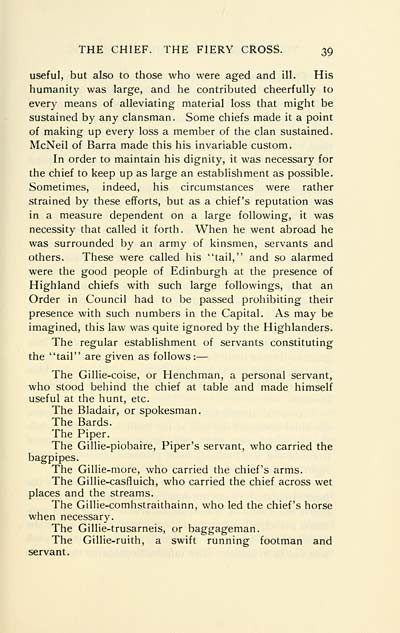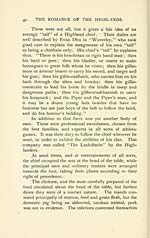Download files
Complete book:
Individual page:
Thumbnail gallery: Grid view | List view

THE CHIEF. THE FIERY CROSS. 39
useful, but also to those who were aged and ill. His
humanity was large, and he contributed cheerfully to
every means of alleviating material loss that might be
sustained by any clansman. Some chiefs made it a point
of making up every loss a member of the clan sustained.
McNeil of Barra made this his invariable custom.
In order to maintain his dignity, it was necessary for
the chief to keep up as large an establishment as possible.
Sometimes, indeed, his circumstances were rather
strained by these efforts, but as a chief's reputation was
in a measure dependent on a large following, it was
necessity that called it forth. When he went abroad he
was surrounded by an army of kinsmen, servants and
others. These were called his "tail," and so alarmed
were the good people of Edinburgh at the presence of
Highland chiefs with such large followings, that an
Order in Council had to be passed prohibiting their
presence with such numbers in the Capital. As may be
imagined, this law was quite ignored by the Highlanders.
The regular establishment of servants constituting
the "tail" are given as follows: —
The Gillie-coise, or Henchman, a personal servant,
who stood behind the chief at table and made himself
useful at the hunt, etc.
The Bladair, or spokesman.
The Bards.
The Piper.
The Gillie-piobaire, Piper's servant, who carried the
bagpipes.
The Gillie-more, who carried the chief's arms.
The Gillie-casfluich, who carried the chief across wet
places and the streams.
The Gillie-comhstraithainn, who led the chief's horse
when necessary.
The Gillie-trusarneis, or baggageman.
The Gillie-ruith, a swift running footman and
servant.
useful, but also to those who were aged and ill. His
humanity was large, and he contributed cheerfully to
every means of alleviating material loss that might be
sustained by any clansman. Some chiefs made it a point
of making up every loss a member of the clan sustained.
McNeil of Barra made this his invariable custom.
In order to maintain his dignity, it was necessary for
the chief to keep up as large an establishment as possible.
Sometimes, indeed, his circumstances were rather
strained by these efforts, but as a chief's reputation was
in a measure dependent on a large following, it was
necessity that called it forth. When he went abroad he
was surrounded by an army of kinsmen, servants and
others. These were called his "tail," and so alarmed
were the good people of Edinburgh at the presence of
Highland chiefs with such large followings, that an
Order in Council had to be passed prohibiting their
presence with such numbers in the Capital. As may be
imagined, this law was quite ignored by the Highlanders.
The regular establishment of servants constituting
the "tail" are given as follows: —
The Gillie-coise, or Henchman, a personal servant,
who stood behind the chief at table and made himself
useful at the hunt, etc.
The Bladair, or spokesman.
The Bards.
The Piper.
The Gillie-piobaire, Piper's servant, who carried the
bagpipes.
The Gillie-more, who carried the chief's arms.
The Gillie-casfluich, who carried the chief across wet
places and the streams.
The Gillie-comhstraithainn, who led the chief's horse
when necessary.
The Gillie-trusarneis, or baggageman.
The Gillie-ruith, a swift running footman and
servant.
Set display mode to: Large image | Transcription
Images and transcriptions on this page, including medium image downloads, may be used under the Creative Commons Attribution 4.0 International Licence unless otherwise stated. ![]()
| Early Gaelic Book Collections > Ossian Collection > Romance of the Highlands > (67) |
|---|
| Permanent URL | https://digital.nls.uk/81816429 |
|---|
| Description | Selected books from the Ossian Collection of 327 volumes, originally assembled by J. Norman Methven of Perth. Different editions and translations of James MacPherson's epic poem 'Ossian', some with a map of the 'Kingdom of Connor'. Also secondary material relating to Ossianic poetry and the Ossian controversy. |
|---|
| Description | Selected items from five 'Special and Named Printed Collections'. Includes books in Gaelic and other Celtic languages, works about the Gaels, their languages, literature, culture and history. |
|---|

